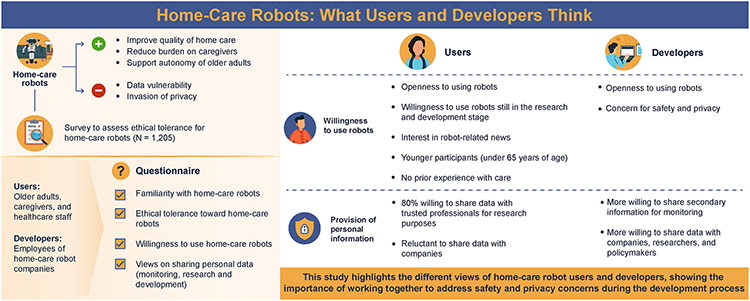Most willing to accept caregiving robots as solution to long-term care challenge
Posted 5 November, 2025
.jpg)
The wheeled robots, called Pepper, have been successfully trialled in some UK care homes, helping to boosted mental health and reduced loneliness
Most people are cautiously open to using robots in home care, (opens in a new window)according to a new international study.
Caregiving robots are expected to play an important role in the future of care services as many countries experience declining birth rates and aging populations.
In Japan, which has the world’s fastest-aging population, it is expected by 2040 for there to be a shortage of more than half a million care workers. Meanwhile in Ireland, by 2057, it is expected for one in every three people to be aged 60 or older.
Researchers from University College Dublin and (opens in a new window)Chiba University surveyed nearly 5,000 people, including older adults, caregivers, families with relatives in need of care, and robot developers, to understand attitudes toward caregiving robots.
The findings show that trust, safety, and privacy are central to public acceptance, with younger adults and women the most open to using robots to provide home care services.
“The shortfall in care workers is a continuing policy priority due to increasing demand, especially with an aging population across the world. Bringing together technology developers, care professionals and users for co-design and co-implementation will be the way forward to improve care systems,” said (opens in a new window)Dr Naonori Kodate, UCD School of Social Policy, Social Work and Social Justice.
(opens in a new window)Published in the journal Computers in Human Behavior, the study asked participants about their willingness to use home-care robots, their comfort with sharing personal data, and their views on different types of information such as vital signs, voice recordings, and location data.

Researchers conducted a large-scale survey among older adults, families, caregivers, and developers to understand the acceptance of home-care robots, highlighting how privacy, safety, and trust influence willingness to use these technologies Credit: Professor Sayuri Suwa, Chiba University
Willingness varied by age and familiarity, with people under 65 the most receptive to using robots to care for themselves and their families.
Women were slightly more positive than men, and those interested in robotics news or testing new robots were also more willing to engage.
There were concerns over data protection as while 80% of users said they would share their health data with healthcare professionals less than half felt comfortable sharing it with robotics companies.
Developers expressed a focus on safety and privacy, while others surveyed emphasise trust and transparency.
Across the board, participants expressed a desire to be involved in developing and improving home-care robots.
“Crucially, the results indicate that greater collaboration between users and developers, together with careful attention to ethical considerations, is essential for accelerating the adoption and societal implementation of home-care robots,” said lead author Professor Sayuri Suwa, from the Graduate School of Nursing at Chiba University.
“Through such collaboration, these robots can support older adults in living independently within their homes and communities, while also easing the burden on family and professional caregivers.”
A previous study by Professor Suwa and Associate Professors Kodate and Sarah Donnelly (UCD) showed more than 70% of the Irish public were willing to allow robots to provide home care services for older adults.
The research team behind this new study included Professor Suwa (Chiba University), Associate Professor Kodate (UCD), Dr Yumi Akuta (Tokyo Healthcare University), Professor Wenwei Yu (Chiba University), Professor Mayuko Tsujimura (Shiga University of Medical Science), and Dr Seiko Iwase (Uekusa Gakuen University).
By: David Kearns, Digital Journalist / Media Officer, UCD University Relations
To contact the UCD News & Content Team, email: newsdesk@ucd.ie






